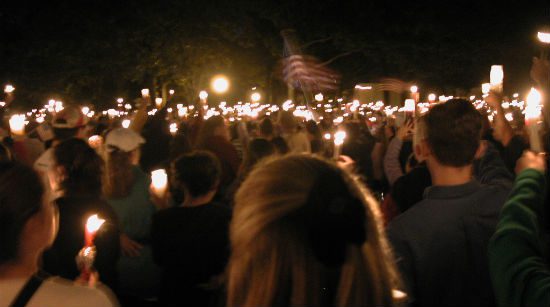Originally posted July 17, 2006.
Read this entire series, for free, via the convenient Left Behind Index. This post is also part of the ebook collection The Anti-Christ Handbook: Volume 1, available on Amazon for just $2.99. Volume 2 of The Anti-Christ Handbook, completing all the posts on the first Left Behind book, is also now available.
Left Behind, pp. 218-219
It is the first Sunday after the Rapture. The world has had less than a week to adjust. The mass disappearances coincided with hundreds of calamitous transportation disasters, all on one day. Tens of thousands are dead. More than a billion are missing, and survivors, family members and rescue workers are still working desperately, five days later, to sort out the dead from the vanished from those merely misplaced by global chaos.
And there are no more children. Anywhere. None.
I mention all this, again, because LaHaye and Jenkins do not. None of this occurs to them, or to their hero, Rayford Steele, who gets up and goes about his Sunday morning just like any other Sunday morning.
Except this week he’s going to church.
Rayford got to the church just before 10 o’clock and was shocked to have to park nearly three blocks away. The place was packed. Few were carrying Bibles, and hardly anyone was dressed up. These were scared, desperate people who filled every pew, including in the balcony. Rayford wound up standing in the back with nowhere to sit.
This is half right. When disaster strikes — fire, flood, mine explosion, school bus accident, terrorist attack, tsunami, Reawakening of the Old Ones — people get scared and desperate and come together, often at a church.
But they don’t wait until Sunday morning, for the next regularly scheduled meeting. They go that day, or that night at the latest. And of course they don’t carry Bibles. They carry candles to keep vigil and they carry handmade fliers with pictures of their missing loved ones.
You’ve seen this. On a smaller scale it happens every day. We are born to trouble as surely as sparks fly upward, and just as surely we will respond to that trouble by coming together and lighting candles. Type “vigil” into Google News and you’ll find dozens of examples in response to recent tragedies all over the world.

Jerry Jenkins apparently has never read these stories. More worrisome: Tim LaHaye who is, among other things, the pastor of a congregation, seems unaware of such stories. Odd.
This may be because they attend churches like New Hope. Irene Steele, you may recall, discovered New Hope church through Christian radio. She chose to attend there due to her affinity for their perspective, even though this meant getting in the car and driving to another town, another parish. Evangelicals like Irene — and like L&J — don’t actually have “parishes,” of course. Instead, they have cars. Thus the size of evangelical congregations is determined not by the demographics of their neighborhood, town or parish, but by the capacity of their parking lot. Such commuter congregations don’t naturally serve as community gathering places in the aftermath of tragedy, when people tend to congregate somewhere closer to home.
There’s something admirably democratic and American about the freedom to comparison-shop for a church unrestrained by the confines of geography, parish and community. But something also was lost when the parking lot replaced the parish as the basic building block of local churches. Commuter congregations sense this and try to compensate by giving themselves names like “New Hope Village Church” or “Community Bible Fellowship.” It’s the same unconvincing ploy made by the builders of those cookie-cutter developments where all the houses are identical and the trees are all the same age. Those too tend to have desperately inappropriate words like “village” or “community” in their names.
The rise of commuter congregations can be seen as the logical extension of the Baptist belief that the church is made up of those who choose to belong to it. So it’s a bit tricky for me, as a Baptist, to be advocating the revival of the idea of the parish. But the freedom to choose whether or not to belong to the congregation is not the same thing as the freedom to choose who else is a part of that fellowship.
Commuter churches seem to offer the freedom to choose — and to redefine — our neighborhood. Neighbor-hood. They raise, again, the question, “Who, then, is my neighbor?” The asking of that question always means one thing: We’re looking for loopholes.















